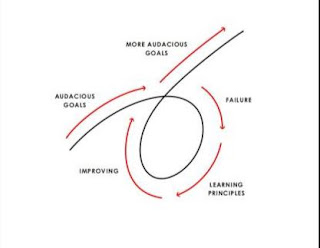Forerunners Course 🎯Session 6
Fall Seven, Rise Eight!
(Courtesy: Rushdhi Ismail, Best Version Of You)
Most people have a wrong attitude towards failure. They consider failure to be something "untouchable", something shameful. But failure is a sign that you are taking action. If you aren't making mistakes, you aren't taking action.
Recall the things you've learned in your life. In EVERY learning experience, failures are an inbuilt feature.
How did you learn to ride a bicycle? Without ever falling down? Every time you fell down, did you give up and say that you'll never ride again? Or did you go back and start paddling again?
The truth is, it's failures that help us learn new things.
This wisdom is beautifully embodied in a Japanese proverb that says, fall seven, rise eight!
When you start closing the gap and taking action, you'll fail. The goal is not to avoid failing but standing up every time you fail. No matter how many times you fail, you have to stand up again and again and again.
You are committed to becoming the best version of you. You are committed to maximising your potential. If that's your goal, know that failure is part of your growth. Ray Dalio puts this wisdom beautifully in his brilliant book "Principles": 'If you're not failing, you're not pushing your limits. And if you're not pushing your limits, you're not maximising your potential'.
These words are a great way of readjusting our attitude towards failure into something positive and promising.
Ray Dalio talks about how failure is part of our growth. He says,
Set audacious goals. (Like becoming the best version of you?)
Fail. (Be ready to embrace failure when you set audacious goals)
Learn why. (Why did you fail?)
Design solution.
Try solution. Spiral up.
And he says that the failing part is especially important.
Why?
You can’t evolve without making mistakes.
Learn to see your failure as this: FAIL = First Attempt in Learning!
Failure vs Sins
Not all failures are sins, but all sins are failures. And Allah subuhanawuta'la created us sinful, weak and flawed.
Abu Huraira reported, that the Prophet (SAW), said:
By Him in whose hand is my soul, if you did not sin, Allah would replace you with people who would sin and they would seek forgiveness from Allah and He would forgive them. (Sahih Muslim 2749)
This is certainly not an open call for us to sin, but an open call to take action and seek forgiveness as soon as we sin.
Just like it is part of our nature to sin, it is part of our nature to act right too. We need to combine these two if we want to evolve as a better version of ourselves.
If you sin, seek forgiveness. Try harder not to repeat the same sin again. If you sin again, seek forgiveness again. And it's an always-evolving process.
For a believer, even his sin can be a blessing. He realises his sin, resolves not to repeat again and asks for forgiveness. That makes him one step closer to Allah subuhanawuta'la.
That's why Prophet (SAW) said, "All of the children of Adam are sinners, and the best sinners are those who repent." (Sunan al-Tirmidhī 2499, Sahih)
He didn't say, the best one is who never sins, instead he said the best is the one who sins but repents. Repentance is a very active process. You need to involve your mind and body to turn to Allah subuhanawuta'la. You need to spend time alone to think what went wrong and how not to repeat it again.
Likewise, learning from your mistakes is a very active process. If you want to become a better version of you, you need to spend some time learning from your mistakes, so that you can avoid making the same mistake again.
Failures are good, but only if you learn a lesson from it. Fall seven, but rise eight with a lesson learned!
Here is how you can come out as a winner after your failures. Ask yourself these two questions:
What is the #1 lesson I've learned through committing this mistake/sin/failure?
What is the #1 strategy not to repeat this again?
Now, go and design a solution! Try it out and spiral up towards your best version!



Comments
Post a Comment